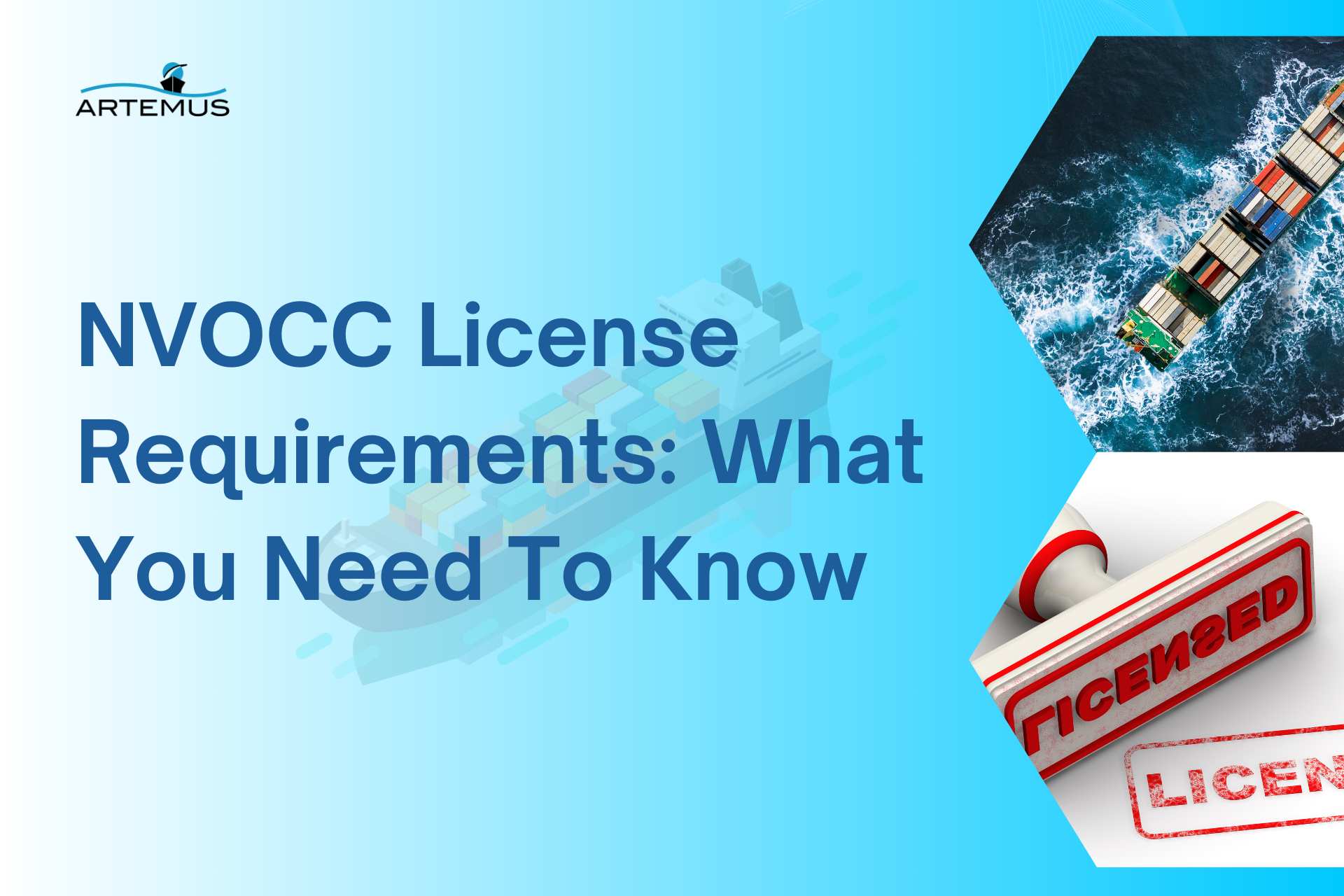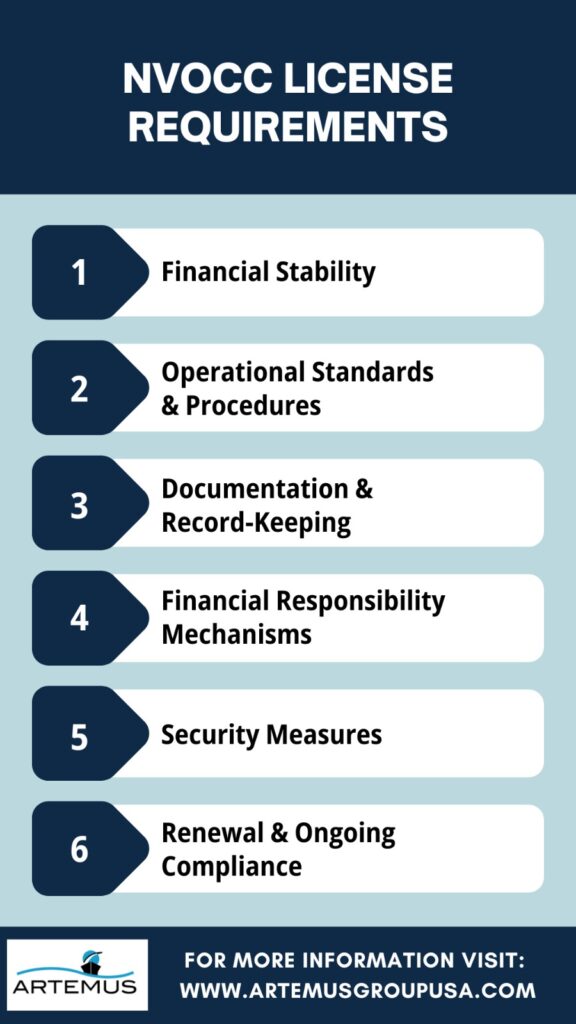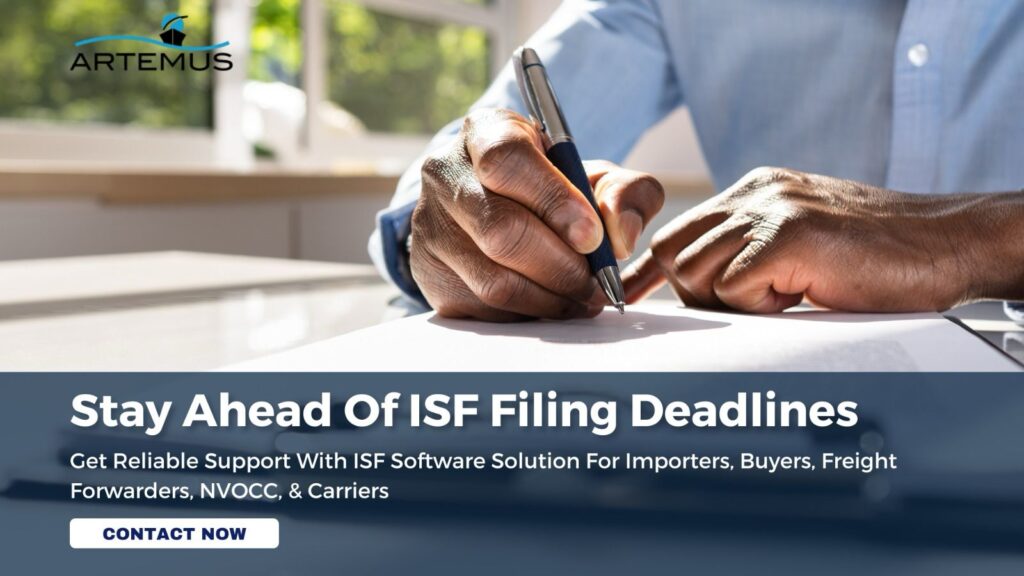
What Is Inbound Logistics & Outbound Logistics? A 2025 Guide
In the dynamic world of supply chain management, understanding the nuances of inbound and outbound logistics is crucial for operational

Welcome to our comprehensive guide on NVOCC (Non-Vessel Operating Common Carrier) license requirements—a critical aspect of the shipping industry that ensures the seamless movement of goods around the globe. NVOCCs play a pivotal role in facilitating international trade by consolidating and managing shipments without operating their vessels.
As a key player in the logistics landscape, obtaining an NVOCC license is crucial for legal compliance, market credibility, and unlocking a myriad of business opportunities. In this blog, we will delve into the intricacies of NVOCC licensing, exploring eligibility criteria, application processes, financial responsibilities, operational requirements, and more.
As an added value, we’re excited to highlight Artemus Transportation Solution, a leading provider of ISF filing software tailored for NVOCCs. Stay tuned for insights that will guide you through the complexities of NVOCC licensing, and discover how Artemus can streamline your compliance journey.
Table Of Contents
An NVOCC (Non-Vessel Operating Common Carrier) license is a regulatory authorization granted by maritime authorities to companies engaged in consolidating and managing ocean freight shipments without operating their own vessels.
Issued by the Federal Maritime Commission (FMC) in the United States and similar authorities in other countries, the NVOCC license signifies compliance with industry standards and regulations.
This license allows NVOCCs to issue their own bills of lading, offering greater flexibility and control over the shipping process. It also establishes credibility and ensures that the NVOCC adheres to the necessary financial and operational requirements, promoting trust and transparency within the maritime industry.
Related: How To Find HTS Code? Tips For HTS Code Identification

Navigating the intricate world of international shipping demands a comprehensive understanding of regulations and industry standards. For companies aspiring to operate as Non-Vessel Operating Common Carriers (NVOCCs), obtaining an NVOCC license is paramount. This license not only establishes legal compliance but also signifies credibility in the global logistics arena. Here’s an overview of the key requirements involved in acquiring an NVOCC license:
One of the primary requirements for obtaining an NVOCC (Non-Vessel Operating Common Carrier) license is demonstrating financial stability. Regulatory bodies typically expect applicants to showcase a robust financial standing, often requiring the submission of audited financial statements. This criterion ensures that NVOCCs have the financial capacity to fulfill their obligations and responsibilities within the shipping industry.
NVOCCs must adhere to specific operational standards and procedures outlined by regulatory authorities. This includes following industry best practices in booking procedures, cargo consolidation, and documentation processes. Compliance with these standards ensures the efficient and secure movement of goods and contributes to the overall integrity of the shipping process.
Rigorous documentation is a key aspect of NVOCC licensing. Applicants are required to submit detailed documentation, such as business plans, organizational structures, and proof of financial responsibility. Maintaining accurate and comprehensive records is crucial not only during the application process but also for ongoing compliance and regulatory audits.
NVOCCs are often required to establish and maintain financial responsibility mechanisms. This may involve obtaining surety bonds, insurance coverage, or other financial instruments. These mechanisms serve as safeguards, ensuring that the NVOCC can cover potential liabilities and fulfill its financial obligations in the event of unforeseen circumstances.
Ensuring the security of cargo in transit is a priority for NVOCCs. Compliance with international security standards is a requirement, and NVOCCs must implement measures to prevent tampering, theft, or any compromise of cargo integrity during shipping. Demonstrating effective security protocols is crucial for obtaining and maintaining an NVOCC license.
Acquiring an NVOCC license is not a one-time process; it requires an ongoing commitment to compliance. NVOCCs must stay informed about changes in regulations, renew their licenses by regulatory timelines, and adapt their operations to evolving industry standards. This commitment ensures that NVOCCs continue to meet the criteria set by regulatory bodies and operate as trusted entities in the global shipping landscape.
Related: HS Code VS HTS Code: 10 Differences You Need To Know
Applying for an Ocean Transportation Intermediary (OTI) license, specifically as a Non-Vessel Operating Common Carrier (NVOCC), from the Federal Maritime Commission (FMC), involves a structured process to ensure compliance with regulations and industry standards. Here’s a detailed guide on how to navigate the application procedure:
Familiarize yourself with the regulations and requirements outlined by the Federal Maritime Commission for obtaining an OTI license, specifically as an NVOCC. This includes understanding financial responsibility, operational standards, and other key criteria.
Gather all necessary documentation to support your application. This typically includes financial statements, proof of insurance, organizational structure details, and any other documentation specified by the FMC. Verify that all documents are precise, thorough, and current.
The FMC utilizes an online system for license applications. Access the FMC’s website and navigate to the Licensing & Registration section to initiate the application process.
Fill out the required application forms provided by the FMC. The forms will ask for detailed information about your business, financial standing, and operational procedures. Ensure that all information provided is accurate and corresponds to the supporting documentation.
Process the required application fees. The FMC typically charges fees for processing license applications, and payment is often made through the online system. Verify the current fee structure on the FMC’s website.
Submit your completed application electronically through the FMC’s online system. This streamlines the submission process and allows for efficient processing.
The FMC will review your application, including the documentation provided. This process may take some time, and it’s essential to monitor the status of your application through the FMC’s online portal.
If the FMC requests additional information or clarification during the application review, respond promptly and provide the necessary details. Being proactive can speed up the process.
As part of the application, the FMC will verify your financial responsibility, which may involve surety bonds, insurance, or other financial instruments. Ensure compliance with these requirements.
Be prepared for potential audits by the FMC during the application process. This may involve showcasing your operational facilities, documentation practices, and adherence to regulatory standards.
Once your application is approved, you will receive your OTI license from the FMC. It is essential to familiarize yourself with the terms and conditions of the license, including renewal requirements.
Consider utilizing compliance tools and software solutions, such as those offered by Artemus Transportation Solution, to enhance and streamline your compliance processes, including ISF filing.
By following these steps and maintaining a commitment to compliance, businesses can navigate the OTI licensing process successfully and position themselves as reputable and reliable NVOCCs in the international shipping industry.
Related: Customs Compliance Software: Key Benefits & Top Suggestions
Ensuring the seamless continuity of shipping operations requires diligent attention to the renewal and maintenance of an NVOCC (Non-Vessel Operating Common Carrier) license. Here’s a concise guide on five key points:
Related: Where Can I Buy A Customs Bond? Understand Your Options
Embarking on the journey of becoming a licensed Non-Vessel Operating Common Carrier (NVOCC) opens doors to numerous advantages in the dynamic realm of international shipping. Here are five key benefits of obtaining an NVOCC license:
Related: ISF Filing: A Compliance-Related Guide & Software Solution

Artemus Transportation Solutions stands out as the premier ISF (Importer Security Filing) software solution for Non-Vessel Operating Common Carriers (NVOCCs), offering unparalleled efficiency and compliance for the complex world of international shipping. NVOCCs face unique challenges in managing Importer Security Filings, and Artemus addresses these intricacies with a comprehensive suite of features.
This cutting-edge software streamlines the ISF filing process, ensuring that NVOCCs can seamlessly submit accurate and timely information to U.S. Customs and Border Protection (CBP). With a user-friendly interface, robust data validation, and real-time status updates, Artemus empowers NVOCCs to navigate the intricate regulatory landscape with ease. By integrating seamlessly into existing workflows, Artemus enhances operational productivity and minimizes the risk of compliance-related issues, making it the go-to solution for NVOCCs seeking a reliable and efficient ISF software solution.
Related: ISF 5: Meaning, Compliance Requirements, & Best Practices
To start a business with NVOCC, obtain the necessary licenses, establish financial stability, build global partnerships, and invest in robust logistics technology for efficient operations.
One disadvantage of NVOCCs is the limited control over vessel schedules, leading to potential disruptions and challenges in cargo routing.
NVOCCs (Non-Vessel Operating Common Carriers) bear liabilities including cargo damage, delays, and errors in documentation during the shipping process.

In conclusion, navigating the waters of NVOCC (Non-Vessel Operating Common Carrier) license requirements is a crucial journey for those involved in the dynamic world of international shipping. We’ve explored the fundamental aspects of obtaining and maintaining an NVOCC license, from eligibility criteria to financial responsibilities and operational requirements. Achieving and maintaining compliance not only ensures adherence to industry standards but also opens doors to expanded business opportunities and enhances market credibility.
Related: What Can I Do With A Customs Broker License? A 2024 Guide

In the dynamic world of supply chain management, understanding the nuances of inbound and outbound logistics is crucial for operational

In today’s interconnected world, businesses rely heavily on global trade to expand their markets, access new resources, and drive growth.

Importing goods for resale in the USA presents a lucrative business opportunity, but navigating the complexities of U.S. customs regulations,
Get In Touch
Artemus’ Software Solutions for ISF, AMS, Japan AFR, eManifest Canada, & Panama B2B filings.